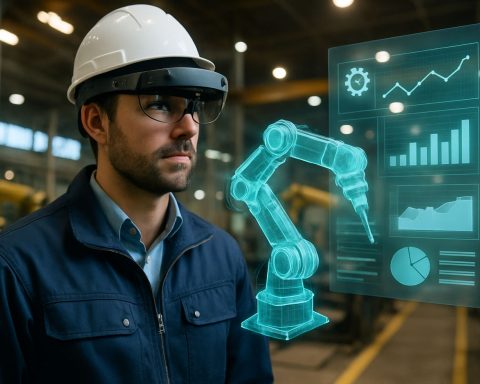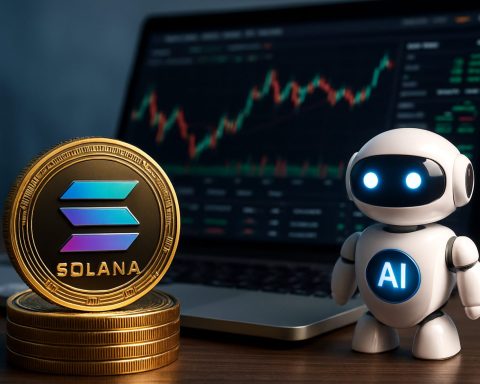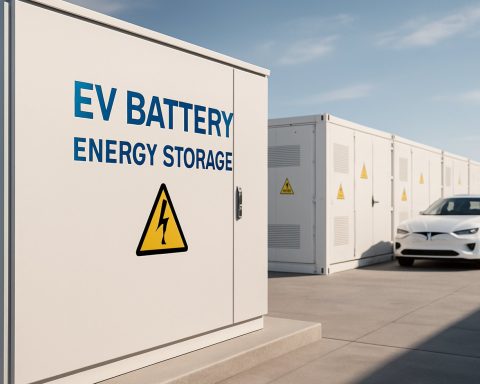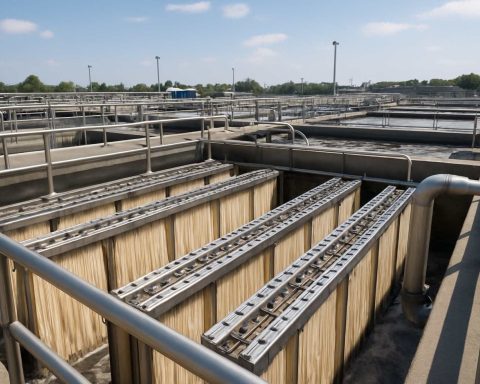- Camacari, a Brazilian city, experienced economic fluctuation with Ford’s exit and BYD’s entry.
- Chinese automaker BYD revitalizes hopes with promised jobs and industry growth, despite recent setbacks.
- Brazil’s EV market is booming, with an 85% sales increase in 2024; BYD leads this green wave.
- Allegations of poor labor conditions at BYD’s site halted factory plans, casting uncertainty.
- BYD responds by ending ties with the responsible construction firm, reaffirming human rights commitments.
- Brazil’s supportive EV policies enhance its goal of reducing emissions, leaning on renewable energy.
- Tension rises as labor unions defend domestic jobs amid global economic shifts at the Camacari site.
- The transformation in Camacari highlights the delicate balance between innovation and ethical labor practices.
The coastal city of Camacari in Brazil’s Bahia state has been a tapestry of economic highs and lows. Once a thriving hub due to the presence of Ford’s massive manufacturing operation, the city faced economic stagnation when the American automaker departed in 2021. An air of hope returned with the announcement by Chinese electric vehicle giant, BYD, proposing to breathe life back into the region. For locals, BYD’s promised factory was more than just machinery and automotive—it was the prospect of stable jobs, rejuvenated industry, and a future to anticipate.
As Brazil climbs the ranks as one of the world’s largest automotive markets, it witnesses an electrifying transformation. Electric vehicles are carving their path into its streets with vigor. In 2024 alone, sales soared by 85%, with more than 170,000 EV units meeting the roads. BYD spearheads this revolution, commanding a lion’s share of the EV market in Brazil. Their vehicles, gliding silently through São Paulo or Brasilia, are already becoming emblematic of a cleaner, quieter future.
However, the dream encountered a stark setback. Controversy erupted with a December raid when Brazilian authorities discovered 163 Chinese nationals enduring harsh conditions at the Camacari site. This discovery paused the factory’s timeline, shrouding its promising narrative with caution and skepticism. The Labor Prosecutor’s Office unveiled images showing unsuitable dormitory conditions and substandard cooking facilities that painted a grim picture of the workers’ situation.
BYD swiftly responded, severing its contract with the construction firm responsible for these conditions. They reaffirmed their commitment to Brazilian laws and upheld the dignity of human rights, yet the chill of uncertainty lay thick among the local workforce. For people like Luizmar Santana Pereira, a former Ford worker now driving a taxi, the shadow of this incident lingers like a gray cloud over dreams of economic revival.
This stutter in BYD’s plans doesn’t dim Brazil’s overall electric vehicle landscape. The nation’s policies favoring EV adoption, reflected through tax incentives and pollution reduction goals, add momentum to this greener chapter. The Brazilian government’s efforts align with its broader mission to address emissions primarily born from deforestation and agriculture, with almost 85% of Brazil’s energy already sourced renewably.
Yet, the factory’s future remains the subject of local and international speculation. Labor unions are adamant about safeguarding Brazilian jobs, forewarning of strikes should foreign workers populate the factory floors. Despite the dominant narrative of technological ambition, the juxtaposition of economic hope and socio-political challenges paints a complex picture.
In the streets of Camacari, vestiges of Ford’s era give way to new signage and emerging alliances. BYD dealerships now share the cityscape, and local customs adapt to the increasing influx of Chinese influencers. A proposal in the local government aims to rename the iconic Henry Ford Avenue, a testament to the symbolic shift on the horizon.
The unfolding story in Camacari serves as a powerful reminder: while technological innovation offers unprecedented growth, adherence to ethical practices and socio-economic balance remains crucial. As Brazil strides forward, the lessons from BYD’s venture become a testament to navigating the tightrope between globalization and local integrity. The narrative speaks not just of economic transactions but also of the intertwined destinies of nations, societies, and the shared hope for a sustainable future.
Camacari’s Journey with BYD: Reviving Economy Amidst Controversy
Economic Revitalization in Camacari
Once a bustling industrial hub, the coastal city of Camacari in Brazil’s Bahia state faced economic downturns after Ford’s departure in 2021. The entry of BYD, a leading Chinese electric vehicle manufacturer, brought renewed optimism as it promised job creation and industry rejuvenation. However, to fully understand the impact and future scenarios, it’s essential to delve deeper into several aspects:
Brazil’s Electric Vehicle Market Surge
Brazil is strategically positioning itself as a key player in the electric vehicle (EV) revolution. The market witnessed an 85% surge in EV sales in 2024, with over 170,000 units sold. BYD commands a significant share of this growing market, depicting a national shift towards environmentally friendly transportation solutions.
Controversies and Labor Challenges
The December raid that exposed harsh working conditions for Chinese nationals at the Camacari site prompted BYD to take corrective actions swiftly. They terminated their agreement with the construction firm responsible for these substandard conditions and emphasized their respect for Brazilian labor laws and human rights. This incident underscores the challenges multinational companies face in maintaining ethical standards while operating in different countries.
Brazilian Government Policies on EV Adoption
Brazil’s government supports the transition toward electric vehicles, offering tax incentives and setting ambitious pollution reduction targets. This aligns with the country’s broader goals of renewable energy adoption, considering that nearly 85% of Brazil’s energy is already sourced from renewable resources. These policies are vital for sustaining the momentum of the EV industry in Brazil.
Labor Unions and Job Security
Local labor unions are vocal about protecting Brazilian jobs amidst the influx of foreign workers. They have signaled the possibility of strikes if the reliance on non-Brazilian labor continues. This highlights the socio-political complexities surrounding globalization and job localization, especially in sensitive industries like manufacturing.
Market Forecasts and Industry Trends
As the demand for sustainable transportation alternatives increases globally, the Brazilian EV market is poised for continuous growth. Companies like BYD are pivotal in this transformation, and their success could attract more international investments into Brazil’s automotive sector.
Actionable Recommendations
1. For Job Seekers: Consider gaining skills related to electric vehicle manufacturing and technology, as these areas are likely to see increased demand.
2. For Local Businesses: Position your products and services to cater to the EV industry. Opportunities exist in components manufacturing, charging infrastructure, and maintenance services.
3. For Policy Makers: Ensure the enforcement of labor rights and support frameworks that balance industrial growth with ethical standards.
4. For Investors: Brazil’s EV market represents a promising investment avenue, bolstered by government incentives and a growing consumer base seeking sustainable options.
5. For Consumers: If considering an electric vehicle purchase, explore government rebate programs and incentives that could make your transition to an EV more economical.
To learn more about Brazil’s automotive transformation and the role of international investments, visit the Investopedia and Financial Times.
As Camacari navigates these economic shifts, the balance between technological advancement and ethical labor practices will be crucial. The story of this Brazilian city serves as a case study of globalization’s impacts and the pursuit of sustainable development.











